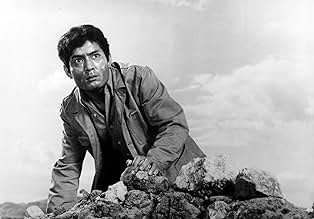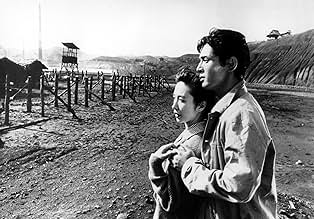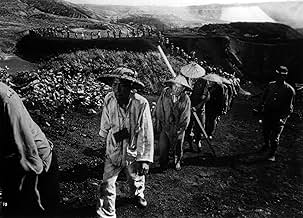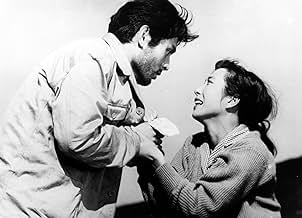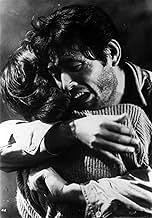AVALIAÇÃO DA IMDb
8,5/10
10 mil
SUA AVALIAÇÃO
Adicionar um enredo no seu idiomaA Japanese pacifist, unable to face the dire consequences of conscientious objection, is transformed by his attempts to compromise with the demands of war-time Japan.A Japanese pacifist, unable to face the dire consequences of conscientious objection, is transformed by his attempts to compromise with the demands of war-time Japan.A Japanese pacifist, unable to face the dire consequences of conscientious objection, is transformed by his attempts to compromise with the demands of war-time Japan.
- Direção
- Roteiristas
- Artistas
- Prêmios
- 5 vitórias e 1 indicação no total
Kôji Nanbara
- Kô
- (as Shinji Nanbara)
- Direção
- Roteiristas
- Elenco e equipe completos
- Produção, bilheteria e muito mais no IMDbPro
Avaliações em destaque
The greatest film ever made! And I've seen many, many films. This even supercedes The Seven Samurai which I consider a masterwork. The Human Condition is 10 hours and in 3 movies. A stunning performance by Tatsuya Nakadai. Find the 3 parts, hie yourself off to a monastery and watch them, with a bit of a breather between each movie. Stroheim's Greed was about 10 hours before the Hollywood hacks cut it back. This one is intact. It is subtitled and not dubbed.
This is an excellent film about one man attempting to change the system. Kaji brings his youthful enthusiasm, idealism, and humanism against a cruel, unjust machine. The acting, direction, and cinematography are all world class. This is a gripping film which will leave you yearning for part two. This is just the start of a stunning epic.
10crubpni
Hello, my name's Jacob. I'm a 21 year old guy, from Israel, forced to join the army at the age of 18 as nearly all people of my country have to, forced to waste 3 years of my life doing things I'd never want to do if only I was allowed to choose. I'm not a great movie buff. I'm a simple person, and I'd rather play a video game to kill time, but I do like action and war films which is how I got to see "The human condition" on some list here on IMDb. Sounded interesting, and so I decided to watch the 3 films. So this is a review about all 3...
The films accurately demonstrates, maybe to the extreme, what it is to be a peace-loving, good human being, in a place where fascism and cruelty reigns supreme. Some people may say that Kaji's character is too unbelievable. Too saint-like, to the point where it becomes frustrating. I say it's not true- It's a movie, not real life. Kaji's behaviour might not be realistic, he faces humanity's worst traits with his own altruist ideals of pacifism and equality, as if he's some sort of WW2 superhero. Saying one cannot identify with him is wrong, however, in my humble opinion, because even if maybe you wouldn't act the way he did when put in the same situations, you can appreciate the way he handled himself, you can admire him and aspire to be like him. He isn't a saint though, he makes mistakes, born out of the cruelty and misery that surrounds him, betraying at times the "code" that he is supposed to protect and follow, but even then, you know that ultimately deep down he's the same person, no matter how things go.
Seeing many many irrational things in my military service, I can relate to Kaji in many ways. Seeing people who dedicate their lives to controlling others for the sake of getting promoted, to get appreciated by their superiors who actually appreciate them about as little as they appreciate their own soldiers. People who care for their own interests far more than they care for the interests of those they are in charge of, crushing their wants and needs and deeming them unimportant in the blink of an eye, while their own interests take much higher priority... People who enforce and follow strict rules that are unbending and unreasonable, with such a passion, that it makes you think any reasonable man would dismiss those people as insane, yet still, those are the people who are in charge, because they are the ones who stay in the army and dedicate their lives to it and to it's incredible stupidity, while the real reasonable people go on to dedicate their lives to do something that might actually be beneficial to humanity. This has now officially become somewhat of a rant of how terrible military life and discipline is, maybe more so than it is a review of this series of movies. But why I am saying all of this? because these observations of mine- they are accurately depicted in this movie. If only these real life people that I know were just trying to be a bit better, a bit more human, more like Kaji, maybe my impression of what the army is like wouldn't have been so gloomy as they are now. Kaji, in the films, tries-everywhere he goes-to set things right for those around him, he goes through so many terrible things, scenes that are so... Vile, and so distorted from what you think of human nature as it is in our usually comfortable modern life, and with sheer willpower, he triumphs, even if his triumph is just in him, staying alive while everything else is gone. But ultimately, does it do him any good? If he were to die in the first movie, would that have been better? saved him the suffering of everything he went through later? Well, that is for you to decide. What these films have taught me, is that no matter how it ends, it is important for a person to do what he sees as the right thing to do, and to never lose sight of what the right thing to do is... I'd define a good movie as one that makes you think at the end. It doesn't have to be a cool plot twist at the end that makes you think, it just has to be a movie complex enough but also engaging enough to make you think at the end, because you didn't have time to figure out everything you wanted while you were watching it. At the end of the third movie however, I didn't have to think of anything. I had already absorbed everything. All I wanted was to sleep, and just couldn't. My mind was empty, and I could feel only one thing- awe. And that is why I rate "The human condition" 10/10.
I'm terribly sorry if what you just read sounded like a bunch of drivel. Maybe this review is not for you, and maybe the movie is not for you. But regardless, I thank you for reading it to the very end. Have a nice day.
The films accurately demonstrates, maybe to the extreme, what it is to be a peace-loving, good human being, in a place where fascism and cruelty reigns supreme. Some people may say that Kaji's character is too unbelievable. Too saint-like, to the point where it becomes frustrating. I say it's not true- It's a movie, not real life. Kaji's behaviour might not be realistic, he faces humanity's worst traits with his own altruist ideals of pacifism and equality, as if he's some sort of WW2 superhero. Saying one cannot identify with him is wrong, however, in my humble opinion, because even if maybe you wouldn't act the way he did when put in the same situations, you can appreciate the way he handled himself, you can admire him and aspire to be like him. He isn't a saint though, he makes mistakes, born out of the cruelty and misery that surrounds him, betraying at times the "code" that he is supposed to protect and follow, but even then, you know that ultimately deep down he's the same person, no matter how things go.
Seeing many many irrational things in my military service, I can relate to Kaji in many ways. Seeing people who dedicate their lives to controlling others for the sake of getting promoted, to get appreciated by their superiors who actually appreciate them about as little as they appreciate their own soldiers. People who care for their own interests far more than they care for the interests of those they are in charge of, crushing their wants and needs and deeming them unimportant in the blink of an eye, while their own interests take much higher priority... People who enforce and follow strict rules that are unbending and unreasonable, with such a passion, that it makes you think any reasonable man would dismiss those people as insane, yet still, those are the people who are in charge, because they are the ones who stay in the army and dedicate their lives to it and to it's incredible stupidity, while the real reasonable people go on to dedicate their lives to do something that might actually be beneficial to humanity. This has now officially become somewhat of a rant of how terrible military life and discipline is, maybe more so than it is a review of this series of movies. But why I am saying all of this? because these observations of mine- they are accurately depicted in this movie. If only these real life people that I know were just trying to be a bit better, a bit more human, more like Kaji, maybe my impression of what the army is like wouldn't have been so gloomy as they are now. Kaji, in the films, tries-everywhere he goes-to set things right for those around him, he goes through so many terrible things, scenes that are so... Vile, and so distorted from what you think of human nature as it is in our usually comfortable modern life, and with sheer willpower, he triumphs, even if his triumph is just in him, staying alive while everything else is gone. But ultimately, does it do him any good? If he were to die in the first movie, would that have been better? saved him the suffering of everything he went through later? Well, that is for you to decide. What these films have taught me, is that no matter how it ends, it is important for a person to do what he sees as the right thing to do, and to never lose sight of what the right thing to do is... I'd define a good movie as one that makes you think at the end. It doesn't have to be a cool plot twist at the end that makes you think, it just has to be a movie complex enough but also engaging enough to make you think at the end, because you didn't have time to figure out everything you wanted while you were watching it. At the end of the third movie however, I didn't have to think of anything. I had already absorbed everything. All I wanted was to sleep, and just couldn't. My mind was empty, and I could feel only one thing- awe. And that is why I rate "The human condition" 10/10.
I'm terribly sorry if what you just read sounded like a bunch of drivel. Maybe this review is not for you, and maybe the movie is not for you. But regardless, I thank you for reading it to the very end. Have a nice day.
This is the first of three very long movies that are based on Jumpei Gomikawa's six-volume series. It is set during WWII and is about a Japanese man named Kaji. Kaji is a very liberal man for the times--something that COULD be very dangerous in the militaristic Japanese society. When he's called up to fight in the war, he's torn. He's basically a pacifist at heart and cannot see himself killing another. Luckily for him, his boss gives him a choice--report for military duty or go off to Japanese occupied territory to be the production head for a forced labor camp. Not surprisingly, he goes to work at the camp--and takes his new wife with him.
When he sees the camp, Kaji is angered--the soldiers brutalize the workers and have absolutely no regard for them. The camp is also rife with corruption. He insists that the beatings MUST stop and he is opposed by the staff--but he's not willing to budge and he has the authority to make it stick. Fortunately, when the workers are better few and treated well, production increases dramatically. However, when there are prison escapes, the hardliners press for a return to brutality. After all, they feel, these aren't exactly humans--just Chinese and Korean conscripts and, worse, Japanese political prisoners. What is Kaji to do? As the film progresses, to save himself he may need to forget about his high ideals. But, can he live with himself? And what about his marriage? Because of the job, he's withdrawn and miserable--and a lousy husband. I'd say more, but this would ruin the film.
Overall, an excellent film that is worth seeing. I am excited to see what happens in the second film, as at the end of the first there is a BIG twist and Kaji's world has been turned upside down in the process. My only question is could this film STILL be a bit sanitized? From what I've read about these camps, they were MUCH more brutal than even the film portrayed.
When he sees the camp, Kaji is angered--the soldiers brutalize the workers and have absolutely no regard for them. The camp is also rife with corruption. He insists that the beatings MUST stop and he is opposed by the staff--but he's not willing to budge and he has the authority to make it stick. Fortunately, when the workers are better few and treated well, production increases dramatically. However, when there are prison escapes, the hardliners press for a return to brutality. After all, they feel, these aren't exactly humans--just Chinese and Korean conscripts and, worse, Japanese political prisoners. What is Kaji to do? As the film progresses, to save himself he may need to forget about his high ideals. But, can he live with himself? And what about his marriage? Because of the job, he's withdrawn and miserable--and a lousy husband. I'd say more, but this would ruin the film.
Overall, an excellent film that is worth seeing. I am excited to see what happens in the second film, as at the end of the first there is a BIG twist and Kaji's world has been turned upside down in the process. My only question is could this film STILL be a bit sanitized? From what I've read about these camps, they were MUCH more brutal than even the film portrayed.
Kobayashi's "The Human Condition" is one of a handful of great anti-war movies. While Japanese film has confronted its own crimes of war more than other cinema, I am only familiar with one other Japanese movie which deals directly with the war & the plight of conscientious objectors: Kurosawa's "No Regrets for Our Youth". Many films deal with the futility of war: "Seven Samurai" & "Yojimbo" come immediately to mind. But "Human Condition" takes on the enormity of war, & the means by which everyone becomes complicit in its total corruption. The hero, though a Conscientious Objector, becomes a colonial occupier, an exploiter of slave labor, an employer of a madam who runs a camp of women & girls impressed into prostitution, & generally runs the gamut of crimes against humanity while trying to maintain his virtue & love's beauty.
Parts II & III also explore the brutality of the army toward its own soldiers, & the complete desecration of the ideals of the Russian Revolution & the cruelty of ordinary Chinese villagers.
"The Human Condition" should be ranked with "Grand Illusion", though what could be as lyrical as the Renoir film? If only this were require viewing in all military academies. If only it were required viewing for all lawmakers & the executive. Is that asking too much?
Parts II & III also explore the brutality of the army toward its own soldiers, & the complete desecration of the ideals of the Russian Revolution & the cruelty of ordinary Chinese villagers.
"The Human Condition" should be ranked with "Grand Illusion", though what could be as lyrical as the Renoir film? If only this were require viewing in all military academies. If only it were required viewing for all lawmakers & the executive. Is that asking too much?
Você sabia?
- CuriosidadesAccording to Tatsuya Nakadai, a marathon screening of the entire nine-and-a-half-hour "Human Condition" trilogy is held once a year in Japan, and he has once or twice attended these screenings, which are always sold out.
- Erros de gravaçãoAt one point a Japanese guard begins to whip Kao, yet the motions he makes are just a flailing of his arms, visibly missing the actor. Kao retaliates by throwing a rock at the guard, but the rock never strikes the guard. However, the actor playing the guard overreacts as if he has been struck.
- Citações
Kuroki Shochô: You know, Kaji, theory may be correct and yet not always apply to reality.
Kaji: Then either the theory is wrong or it was incorrectly applied.
- ConexõesFollowed by Guerra e Humanidade: Estrada Para a Eternidade (1959)
Principais escolhas
Faça login para avaliar e ver a lista de recomendações personalizadas
- How long is The Human Condition I: No Greater Love?Fornecido pela Alexa
Detalhes
- Data de lançamento
- País de origem
- Idiomas
- Também conhecido como
- Guerra e Humanidade
- Locações de filme
- Hokkaido, Japão(Exterior scenes of the Manchurian mine)
- Empresas de produção
- Consulte mais créditos da empresa na IMDbPro
- Tempo de duração3 horas 28 minutos
- Cor
- Mixagem de som
- Proporção
- 2.35 : 1
Contribua para esta página
Sugerir uma alteração ou adicionar conteúdo ausente

Principal brecha
By what name was Guerra e Humanidade: Não há Amor Maior (1959) officially released in India in English?
Responda

